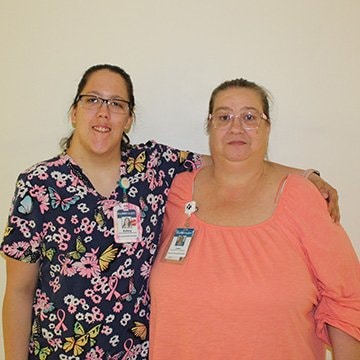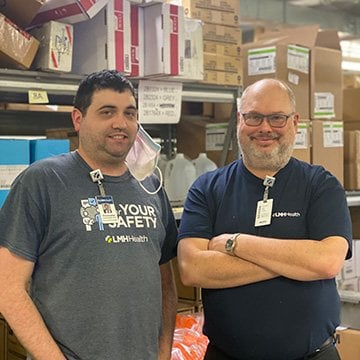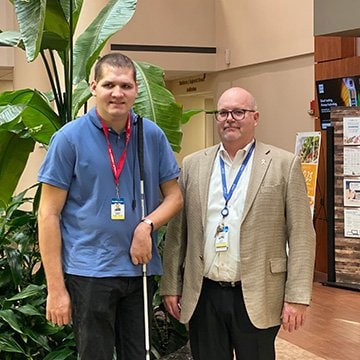Project SEARCH provides opportunities for everyone
Since its inception, Project SEARCH has been a program with one main objective - to secure competitive employment for people with disabilities. The program has been a mainstay in the Lawrence community for more than a decade, helping to provide interns with occupational skills, personal growth opportunities and job placements.
Project SEARCH was founded in 1996 by Erin Riehle, the director of Cincinnati Children’s Hospital Medical Center’s emergency department. The program’s goal was to not only serve individuals with developmental disabilities, but commit to hiring people in this group. Together with a partner, a program was created to train people with developmental disabilities to fill some of the high-turnover, entry-level positions at the organization.
“Project SEARCH is all about training our students, also known as interns, to achieve competitive and integrated employment,” said Becky Armstrong, LMH Health Project SEARCH Coordinator. “Per Project SEARCH, competitive employment means that once individuals are hired in paid positions in community businesses, they would work 16 or more hours per week earning minimum wage or above, whatever the position’s wage is specified to be.”
Lawrence Public Schools brought Project SEARCH to the community in 2011 as part of a collaborative process to pilot the program in Kansas. The current program maintains a partnership with two sites in Lawrence: LMH Health and the University of Kansas. Prospective interns apply in November of their senior year of high school. Following the application process, they participate in an assessment day where they work through different job rotations and complete an interview.
“A lot of our former and future interns are hands-on learners. They really grow in an environment where they explore and practice trades,” said Tracey Norris, Project SEARCH coordinator at the University of Kansas. “The assessment day allows us to see what spikes their interest and if they will be a good fit for the organization.”
Once candidates enter the program, they complete three internships over the course of 10 weeks. This allows them to try to different things than they are interested in and learn an array of skills.
“Since we are under a 10-week time constraint for each internship, we provide extensive training initially with job coaches with the goal of fading that support so interns’ tasks can be completed independently,” said Armstrong.
Interns split their day between a classroom setting and their work rotation. The goal of the classroom learning is to teach skills, such as budgeting, and how to access resources, as well as provide a safe area where they can discuss challenges they may face in the workplace.
“Project SEARCH is all about learning and developing new skills,” said Norris. “We are all growing and evolving together. It can be functional and hands-on. It’s not a cookie cutter program, so we can adjust to meet individual needs.”
Current Project SEARCH interns at LMH Health work in these departments: materials management, central supply, education, facilities, admissions, therapy, food and nutrition, environmental services and on patient floors. Previous interns worked in other departments, including Lawrence OB-GYN Specialists, Plastic Surgery Specialists of Lawrence, human resources, the LMH Health Gift Shop, OrthoKansas and health information management services.
“Project SEARCH is based on the idea that people can achieve great things,” said Armstrong. “If we hold people to high standards and believe that they can do it, they can succeed with additional training and support if needed.”
Project SEARCH does not only focus on training interns to enter the workforce. It heavily focuses on the soft skills that they will need to succeed in life.
“Some of the biggest growths we see in the students are in their growth of confidence and willingness to try new things,” said Norris. “We have seen people develop independence and stronger personal and professional relationships. It can be a huge quality of life change for the interns in our program.”
LMH Health's first Project SEARCH interns

Kelsey Leonard and Lori Randel
Kelsey Leonard and Chris Tomei were a part of the first class of interns at LMH Health in 2012 and are currently employed with LMH Health.
Leonard’s journey started after she graduated high school. She wanted to do more, so after completing another USD 497 transition program called “C-Tran,” she applied for and was selected to participate in the USD 497 Project SEARCH program.
“The Project SEARCH is for adults with intellectual disabilities that just need some help with job skills and transitioning into employment, which really helped,” she said.
She split time between three rotations at LMH Health, working on the fourth and second floor, as well as with therapy services and environmental services.
“I trained Kelsey in housekeeping,” said Lori Randel, environmental services supervisor and Kelsey’s former mentor. “Not everybody learns the same way, so not everyone trains the same way.”
After completing her internship, Leonard was hired as an environmental services technician. She has worked at LMH Health for over 10 years and looks forward to continuing to grow her career.
Project SEARCH helped Leonard improve her social and time-management skills. She applied the new talents she learned in her internship towards achieving one of her goals to move out and live independently.
“The moving part was hard at first, but it was easier once I know how to get organized,” she explained. “I learned in Project SEARCH to prioritize, so I was able to know what I wanted to take with me and what I did not.”
Interns such as Leonard have left their mark on LMH Health employees. Mentors often remark that they to have improved their communication skills and how they manage tasks from their time working with Project SEARCH interns.
“Adults with learning disabilities don’t normally get a chance to have this support,” said Randel. “It’s giving them a chance to have a purpose; it’s giving the same chances as everyone else.”
"A cornerstone of the department"
Tomei is a no nonsense type of guy when it comes to work. He is often found livening up the halls of LMH Health as he delivers boxes from materials management. He completed two rotations in the cafeteria and calls his favorite the one he completed in materials management with his mentor and family friend, supply clerk Bob Lagerstrom.

Chri Tomei and Bob Lagerstrom![]()
“Between Bob and my dad, they drilled work ethic into me,” said Tomei. “Bob helped me memorize my job. I’ve gotten better with accuracy and making sure everything gets to the right spot. I stack it up like a domino and find a way to get rid of it.”
Project SEARCH helped Tomei focus on bringing his skills together and preparing for a career. It gave him the opportunity to meet an array of people and leave a lasting impression. When Tomei graduated from Project SEARCH, there wasn’t a position available at LMH Health, but Lagerstrom kept him in the back of his mind.
“One day my dad called me and told me that I better go to LMH Health and apply because Bob might have a spot for me,” said Tomei. “I must have made a good impression, because he wanted me back.”
As cornerstone in materials management, Tomei takes away some of the stress that comes with the amount of tasks staff has each day.
“For the longest time I did not associate Chris with anything but a crazy hard working guy. He has been such an asset to us,” Lagerstrom said. “There are a lot of days that without him, we would have been here until the evening. He makes it so that we can function. For the most part, he is the public face of our department since folks see him every day.”
Project SEARCH has not only opened doors for former interns like Leonard and Tomei, but for countless other interns who have worked at LMH Health and KU.
“The most important thing people need to know, is that it is not the worst idea to get people with no work experience trained in the right environment,” said Tomei.
Here's to the future
Project SEARCH allows for people, such as current EVS intern Tucker Wagner, to plan for a brighter future.
“Project SEARCH is a lifesaver,” said Wagner. “It has help me succeed in many areas, such as independence and confidence, and I feel like I have learned new skills.”

Tucker Wagner and John Geiger
Wagner is a testimony to the hard work and dedication of Project SEARCH interns.
“When I started high school, I started to look at my options for after graduation,” he said. “Since I am blind and read braille, I was told that college wasn’t an option. I knew I wanted to participate in Project SEARCH since middle school.”
Wagner completed his first rotation at the KU Monarch Watch before moving on to a campus library where he helped label braille books that had been mislabeled or did not have a label. His second rotation was with LMH Health’s EVS and cafeteria.
“I have increased my independence and memorization,” he said. “Here at LMH Health and with Project SEARCH is where a lot of my skills have come into play and improved.”
Wagner’s next vocational challenge within his current work rotation will be working on an inpatient floor at LMH Health. He will be responsible for gathering patients’ opinions on their meals and inputting the data electronically.
“Everything they are learning here are life skills,” said John Geiger, Project SEARCH mentor and director of dining services. “They wake up with a place to go, to work, and place that gives them a sense of purpose.”
Since starting his internships, Wagner has grown in confidence and is taking steps toward reaching his goal of independence.
“A very long-term goal is to live independently, have a paid job and use transportation on my own,” he said.
More than a drop in the ocean
Just as LMH Health employees and mentors have shaped Project SEARCH’s interns, the interns have helped shaped LMH Health.
“We have a lot of great staff - you bring up the term Project SEARCH and their eyes light up,” Ken Sarber, director of education and learning services and Project SEARCH liaison said.
Every intern that has passed through LMH Health’s doors has left a lasting impression on their departments. Many departments report on a department-wide increase in clearer communication, patience and understanding. But most importantly, employees mention the growth in sense of community.
“We’ve taken people that would have been forgotten and now they are out here working and leading normal lives,” Lagerstrom said. “The person who came up with Project SEARCH needs a lot more kudos than they’ve received.”